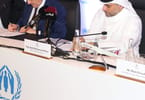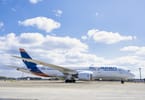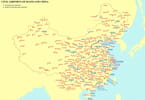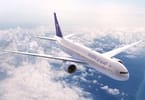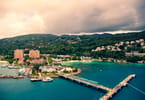MANILA, Philippines (eTN) – Philippine Airlines recently reported losses of $10.6 million for the first quarter of its financial year, but it does not deter the optimism of PAL President Jaime Bautista about the long-term perspectives of Southeast Asia’s oldest air carrier. “This is a very challenging year, especially as fuel prices are reaching a new peak. But I am confident that we still will remain profitable this year,” said the PAL President in an exclusive interview to eTN.
The airline carried last year some 9 million passengers, slightly down from 9.3 million passengers a year earlier. This result can be explained by the fact that some domestic passengers switched to PAL’s low-cost subsidiary, Air Phil Express. In FY 2010-11, PAL achieved a profit of US$72.5 million over total revenues of US$1.6 billion, after losing US$14.5 million a year before.
Remaining profitable for the current fiscal year could come, in fact, from PAL’s latest round of restructuring, which saw the outsourcing of non-core operations. Measures to subcontract ancillary activities such as ground handling, catering, or call-center operations would help to reduce the PAL working force to 4,400 employees, compared to the current manpower of 7,000 people.
“We must get leaner and more efficient if we want to attract foreign investors and compete efficiently against other airlines, including low-cost carriers. This is a question of survival,” added Jaime Bautista. Outsourcing is expected to reduce the carrier’s operating costs by up to US$15 million a year.
The working environment has been very challenging on both the international and domestic fronts. “We faced the consequences of political turmoil in the Middle East, as well as the earthquake and tsunami in Japan, which depressed travel demand in both markets,” described Mr. Bautista. In Japan, the PAL President estimates the decline in passengers at 20%. “We, however ,maintained our yields and even increased slightly our fares by adjusting our capacity. We how resumed all of our frequencies to Tokyo Narita, Fukuoka, Nagoya, Okinawa, and Osaka,” he said. After resuming flights to Saudi Arabia in March 2010, PAL finally suspended again its route to Riyadh last April.
“Competition is now very tough on all routes to the Middle East due to the aggressive expansion of Gulf carriers into the Filipino market. There are over 70 frequencies per week from those airlines to Manila now,” highlighted Jaime Bautista.
PAL does, in fact, disagree with the way open skies are currently granted by the government to foreign airlines. “Let’s be clear about it. We are not against an open skies policy as long as it is balanced. We can’t just give rights to anyone without being allowed ourselves to benefit from the same rights. This is what happens for example to Canada where we can’t fly where we would like,” stressed Mr. Bautista.
PAL has not been helped by the Filipino Civil Aviation authorities. Neglecting the upgrading of safety at Manila International Airport conducted both the US Federal Aviation Administration (FAA) and EU Aviation authorities to rule against the Filipino airlines. The FAA downgraded Manila airport from Category I to II, clipping PAL – consequently PAL wings – by freezing any expansion to the USA.
“We have an open skies agreement with the US and would love to fly to New York, Chicago, or even Houston and put our newest Boeing B777 in service. But we can’t, due to the downgrade. In Europe, all Filipino carriers are now put on [the] EU black list despite the fact that we pass successfully all safety controls imposed by international institutions such as IATA,” added Mr. Bautista.
With the government now putting absolute priority to Manila Airport’s safety upgrading, PAL’s President is optimistic to see the ban removed by March of next year. Much of PAL’s future evolution then remains dependant on the government’s ability to fix the woes at the country’s civil aviation infrastructures. “We also consider flying again to Europe as we acknowledge that there are not enough capacities. We would likely serve Frankfurt or Munich, as we could benefit from good feeder services to the rest of Europe,” estimated PAL’s President.
The airline is due to take delivery of 4 new Boeing 777, with delivery starting next year, as well as a new Airbus A320 for its regional network. “We are now looking at aircraft to replace our Airbus A330 over the next 5 years. We [are] look[ing] closely at Airbus A350 and Boeing B787,” described Mr. Bautista. For the time being, PAL is looking at further expanding into Asia. The carrier recently opened a daily frequency to Delhi via Bangkok and is looking at more destinations in China. “Guangzhou is an option. We [are] also look[ing] currently at serving Cambodia,” said Mr. Bautista.
PAL does not exclude also joining an alliance, most probably in a 2- to 3-year time frame. Oneworld could be one of the best options, as PAL enjoys a strong relation with Cathay Pacific, as well as Malaysia Airlines. The carrier’s network, with its extensive flights to North America and North Asia (especially to Japan), as well as Australia, could, in fact, fit very well into Oneworld’s own global network. Flying to Munich could also create synergies with Air Berlin.
A smiling Jaime Bautista explained that his ultimate ambition is to make PAL a 4-star airline. “We are embarking to make again PAL one of Southeast Asia’s leading carriers. We are finally the region’s oldest carrier with 70 years experience. And we are still looking at being around for a long time,” he told.





